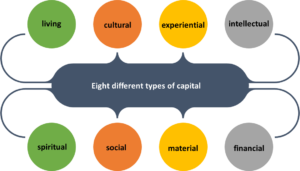Most people who are paying attention should be persuaded that we do need to redesign the foundation of our current economic systems and the trends of material and energy use that are associated with it by the simple realization that on a finite world a system based on unlimited material growth is impossible or that there is a clear message in the term “non-renewable resource” alone. Also, the frequency of economic crises that have a negative impact on the world economy is increasing, the cost of bailouts and rescue packages is increasing quickly, and the repercussions of national and global inequalities are endangering the environment, social cohesion, health, and security.
We urgently need to transition from a degenerative economic system, which encourages (directly or indirectly) the destruction of biodiversity, ecosystem integrity, planetary wellness, and socioeconomic well-being, to a regenerative economy, which encourages the protection and restoration of all of the aforementioned, as well as the regeneration of the essential resources required to meet human needs in closed-loop, renewable energy-based, and environmentally and socially benign systems. The development of regenerative cultures can be facilitated by the creation of economic structures and policies, and an increasing number of individuals, groups, and networks are already investigating how we might do this.
Instead of continuing the trend where life seems to be increasingly governed by the rules of the financial system, we need to rebuild the financial system to operate in accordance with the laws of life. When wealth is viewed holistically, it largely manifests as the state of the entire system. A regenerative culture and many features of healthy cultural systems cannot be reduced to monetary sums of money. These are attributes that are rooted on being fostered by and cultivating collaborative partnerships, hence they elude quantification.
Wealth will be redefined in a regenerative economy in terms of numerous forms of capital instead of just financial capital. An enlarged understanding of wealth based on eight different types of capital was offered by Ethan Roland and Gregory Landua as a whole-systems map of economics: living, cultural, experiential, intellectual, spiritual, social, material and financial capital.
One of the most important steps in developing a regenerative economy is to reroute the flow of financial resources away from the speculative to the real economy as well as from destructive and exploitative to generative and for-benefit firms.
Furthermore, we must rethink the function of the banking system in order to create a regenerative economy. A network of independent banks called the Global Alliance for Banking on Values aims to provide sustainable development for “underserved people, communities, and the environment” through the use of finance. The alliance consists of leading, cutting-edge financial institutions from all six continents who are dedicated to: (i) “delivering social finance products,” (ii) “financing community-based development initiatives and social entrepreneurs,” (iii) “fostering sustainable and environmentally sound enterprises,” (iv) “fulfilling human development potential, including poverty alleviation,” and (v) “generating a triple bottom for individuals, the planet, and profit.”


